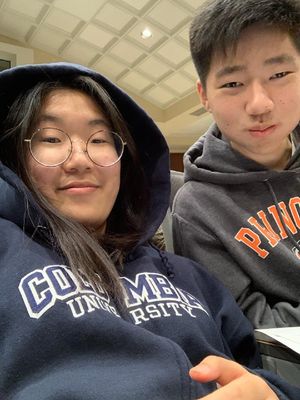[JSR] The Importance of Maintaining Korean Culture in Younger Generations
Second Generation Korean Americans are without a doubt very Americanized by the way that they have almost forgotten about their Korean identities. Although this is subjective to the type of friends that one might surround themselves with, most of my Korean friends are unable to speak Korean fluently, or have very noticeable “American” accents. I am definitely a part of this group, and because of this it has become difficult to communicate with my parents.
Jude Choi, Grade 11 John Marshall
I interviewed my very close friend, Sua Shin, a junior at North Hollywood High School and first-generation immigrant from Korea, and what she said brought up a very interesting and thoughtful point. Second-generation Korean Americans have created their own culture in their cliques at school and when they hang out with friends outside of school. We see it everywhere, with the Vans shoes or Anti-Social Social Club attire. Koreans-Americans have created a culture and it has become so prevalent in second-generation Korean-Americans that it has a good chance of eliminating much of our original Korean ways of life. We have forgotten what Korean culture is all about (hard work, dedication, etc.), and have made no efforts to keep it. It’s what made us Korean and what keeps us Korean. “It’s another identity for Koreans,” said Sua Shin when asked about maintaining Korean culture.

Me and interviewee Sua Shin, two second-generation students relaxing before class in our own style of dress and attitude.
Language barriers. As I have mentioned before, language barriers are a problem in many second-generation Koreans. For me, it has becomes difficult to communicate with my own mom and I have only gotten by with my dad because he has taken the time and effort to learn English. Sophia, during the interview, said that although being able to speak Korean fluently is a necessity, and that second-generation Koreans not being able to communicate with their parents. is, “an unfortunate result.”
When Korean-Americans first started moving to the United States in the late 1900s, they made an effort to learn English and assimilate into American culture; and thus began the snowball effect of second-generation Korean Americans having trouble with their own language. Not knowing how to speak Korean can have such effects as (and the most obvious) not being able to talk with our own parents, not being able to visit Korea because one doesn’t know how to speak the language, as well as other issues. How can we combat this? Well for one, parents can do their part by starting to speak more Korean to their child and have them practice by responding back. Even sending them to a Korean school can be beneficial. It’s only a matter of time before the second-generation give’s way to the third, and the Korean culture and identity are all but erased in America.
To finish, I will leave a quote by Sophia that should resonate with all ears, Korean or not. “I don't believe that being able to speak Korean fluently is a necessity or a reason to judge. I do see the impact that language barriers can have between generations of Korean Americans - it's undeniable that it can be painful for children, parents, and grandparents to have difficulty communicating with each other. However, given the challenges of growing up as immigrants or children of immigrants, language barriers can be an unfortunate result.”










with the Korea JoongAng Daily
To write comments, please log in to one of the accounts.
Standards Board Policy (0/250자)